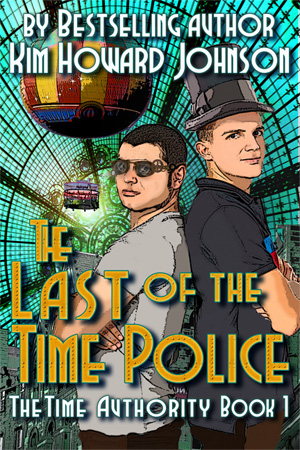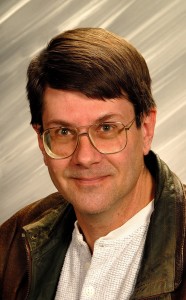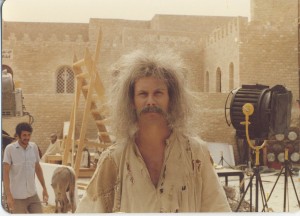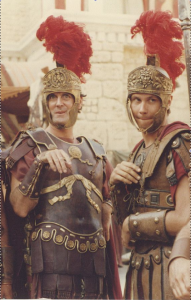I used to work with agents on my non-fiction, but it’s a long, long process, and I don’t have the patience that I used to. When Laurie showed me how relatively simple it is to e-publish, I jumped all over it. And I’m loving it!
Kim Howard Johnson – 22 September 2013
The Back Flap
It’s “The Hitchhiker’s Guide to the Galaxy” meets “Time Bandits” in this action-packed science fiction adventure.
Some careless littering by a pair of time travelers sets off a Chronological Anomaly that may lead to the destruction of modern history. Our Time Line’s only hope: those same bungling Time Police, who are sent back to clean up their mess before the world as we know it ceases to exist. To succeed, Stan and Jack need the assistance of Benjamin Franklin in order to find a displaced Leonardo DaVinci.
About the book
What is the book about?
The Last of the Time Police is a Pythonesque adventure about the two least competent members of the Time Authority, which is charged with correcting disruptions to the established Time Line. Stan and Jack are sent to the past to pick up a candy bar wrapper, but in the process, they accidentally transport Leonardo DaVinci to Victorian England, where the government puts him to work. The result is a Chronological Anomaly that threatens to wipe out all reality. Oops.
When did you start writing the book? How long did it take you to write it?
I started writing the book over ten years ago. I had written several books before that, including a best-seller for a major publisher, but I’d always wondered if I could write a novel. I decided that if I wrote a page a day, every day for a year, then at the end of the year I would have a book. It might not be a good book, but I’d at least have finished one. So I finished the first draft, but before I could do anything else with it, I began working for John Cleese and re-located for several years.
Then about a year ago, I dug it up again and wondered if it was any good. I read it and was surprised at what a good job my ten-years-younger self had done with it. I still had to put in a few months editing and re-writing, and I was pretty pleased with it. Nevertheless, when I finished, it was still too long. My wife Laurie said “There’s a natural point in the middle where you could break it into two books.” She was right, as she usually is. It turns out I’d written two books—The Last of the Time Police and The Return of the Time Police. And there are more to come!
Where did you get the idea from?
I’d always liked the idea of time travel and alternative histories. Back in the ‘70s, my friend Terry Gilliam showed me some pictures of an alternative vision of Victorian London—it was steampunk before anyone had ever heard of the word.
I had long since forgotten about them, until the idea of a time travel story came about. I had always been a fan of Douglas Adams’ Hitchhikers Guide to the Galaxy, in part because of the subject matter, but even more for the tone of the writing. Douglas had worked very briefly for Monty Python and so had I, so I decided to push my luck and write a SF book with that same sort of tone. I don’t know if anybody reading Last of the Time Police nowadays could detect anything of the kind, but that’s how it started out!
So, Douglas was definitely an influence. I first met him the year before I started writing my book. He came to Chicago with my dear friend Terry Jones to promote a book, and we all went out for dinner and drinks afterward. I wish I could say that he gave me inspirational words of wisdom, but it was way too raucous and we were all scolded several times by the restaurant management. Thankfully, Laurie was my designated driver!
Were there any parts of the book where you struggled?
Absolutely! I’ve always felt that if I know where a story is going, the readers will too, and I always want to surprise the readers. When I got close to the end of what is now the second book (The Return of the Time Police), I realized that if my characters succeeded in their mission and prevented a Chronological Apocalypse, then they would all be wiped out of existence! Which would be kind of a depressing way to end a book. “Hooray! You’ve saved the world! Now you’re all going to cease to exist.” So I had to figure out how to save the world and save my characters. I came up with a twist that I’m quite proud of.
What came easily?
Constructing the story was the most fun for me, and it was quite enjoyable. It was a lot like putting together a jigsaw puzzle. All the pieces have to fit, and if you change one, you generally have to change several of them. And let’s face it, time travel is tricky! That’s one thing that frustrates me about most time travel stories. If just one thing in the past is changed, the changes multiply and accelerate through the years, and it’s virtually impossible to set things right. That’s why I’m rather pleased with the way I resolved my whole story.
Are your characters entirely fictitious or have you borrowed from real world people you know?
One of the most enjoyable aspects of The Last of the Time Police and The Return of the Time Police is combining real-life historical characters with my creations. Leonardo DaVinci and Benjamin Franklin have just as big a role in the story as Sam and Jack, and I loved being able to write them.
The most interesting real-life character, one that almost no one has heard of, is undoubtedly Samuel Warner. He invented the torpedo, but the mystery of his death inspired my story and several of my characters. In London’s Brompton Cemetery, there is a mysterious mausoleum that some people believe is actually a time machine. Google it. Go ahead, I’ll wait. It’s an odd structure built by Warner and Egyptologist Joseph Bonomi for a Victorian spinster and her daughters. I discovered their story early on in the writing, and they all became character in my book.
About Writing
Do you have a writing process? If so can you please describe it?
The most difficult part of the process for me is to keep my butt in the seat. I’ll generally take the dogs out, then boot up the computer and review what I wrote in my previous session. Then I’ll realize I need a cold drink nearby (a hot drink in the wintertime), so I’ll get something from the refrigerator. I’ll start to focus on the manuscript, and then the dogs will have to go out again. Once the dogs are settled, I’ll try to concentrate on my writing, and then remember an email I needed to respond to, and a phone call I have to make. I’ll take care of that, then just before I can start once again, I have to take the dogs out one last time. Then, and only then, can I start my writing.
Do you outline? If so, do you do so extensively or just chapter headings and a couple of sentences?
I keep very sketchy notes. If I do too much planning, I’ll get bored and readers won’t be surprised, which is a deadly combination, as I mentioned previously. I was lucky enough to study improvisation under the great Del Close (I later co-wrote Truth in Comedy with him and wrote his biography The Funniest One in the Room). The same rules of improvisation that performers use are also generally very useful rules for writers, and I utilize them whenever possible.
Do you edit as you go or wait until you’ve finished?
I like to wait until I’m finished, but there always seems to be something that has to be addressed along the way. I don’t mind, as I find editing is usually easier for me than writing.
Did you hire a professional editor?
I used to work as a copy editor for a newspaper, so I try to do my own editing (What do they say about a fool for a client?). Fortunately, my wife is a writer, and she sometimes enlists some of her friends in her Romance Writers of America group to run their eyes over my stuff as well.
Do you listen to music while you write? If yes, what gets the fingers tapping?
I envy people who can write while listening to music. Unfortunately, I am not one of them. Whenever I try it, I end up turning the volume down lower and lower so I can concentrate, until I finally end up shutting it off.
Did you submit your work to Agents?
I used to work with agents on my non-fiction, but it’s a long, long process, and I don’t have the patience that I used to. When Laurie showed me how relatively simple it is to e-publish, I jumped all over it. And I’m loving it!
What made you decide to go Indie, whether self-publishing or with an indie publisher? Was it a particular event or a gradual process?
The whole process never really seemed practical. And then, my wife’s RWA friends began doing it, and they taught her to do it, and she taught me to do it. It’s gone viral!
Did you get your book cover professionally done or did you do it yourself?
I found someone on-line who did an amazing job, and charged relatively little. Of course, now that I said that, she’ll probably raise her price…
Do you have a marketing plan for the book or are you just winging it?
I used to do marketing for a living, but on-line marketing is a whole different animal. I’m slowly but surely figuring it all out, and having fun doing interviews like this in the process!
Any advice that you would like to give to other newbies considering becoming Indie authors?
Marry someone who knows all about it, and be very nice to them so that they’ll teach you how to do it yourself!
About You
Where did you grow up?
I grew up in Ottawa, Illinois, not far from Chicago. I’ve spent time in the Midwest, London, and Germany, and several years in Chicago and Santa Barbara.
Where do you live now?
I’m right back where I started!
What would you like readers to know about you?
I’ve written non-fiction (The First 280 Years of Monty Python), I’ve written biography (The Funniest One in the Room), I’ve written memoirs (Monty Python’s Tunisian Holiday, about my life on the set of Monty Python’s Life of Brian in Tunisia), co-written an improvisational manual (Truth in Comedy), a graphic novel (Superman: True Brit) and other comic books, co-written a YA novel with my wife (The Dare Club: Nita), and written hundreds of magazine articles. But I’ve never had more fun than I have had with The Last of the Time Police!
What are you working on now?
I’m researching a history of The Committee, the legendary West Coast improvisational group, and as soon as I finish that, I’ll be starting on the third Time Authority book.
End of Interview:
Get your copy of The Last of the Time Police: The Time Authority Book One from Amazon US or Amazon UK.
And as you might expect, you can get a copy of The Return of the Time Police: The Time Authority Book Two from Amazon US or Amazon UK, too.




